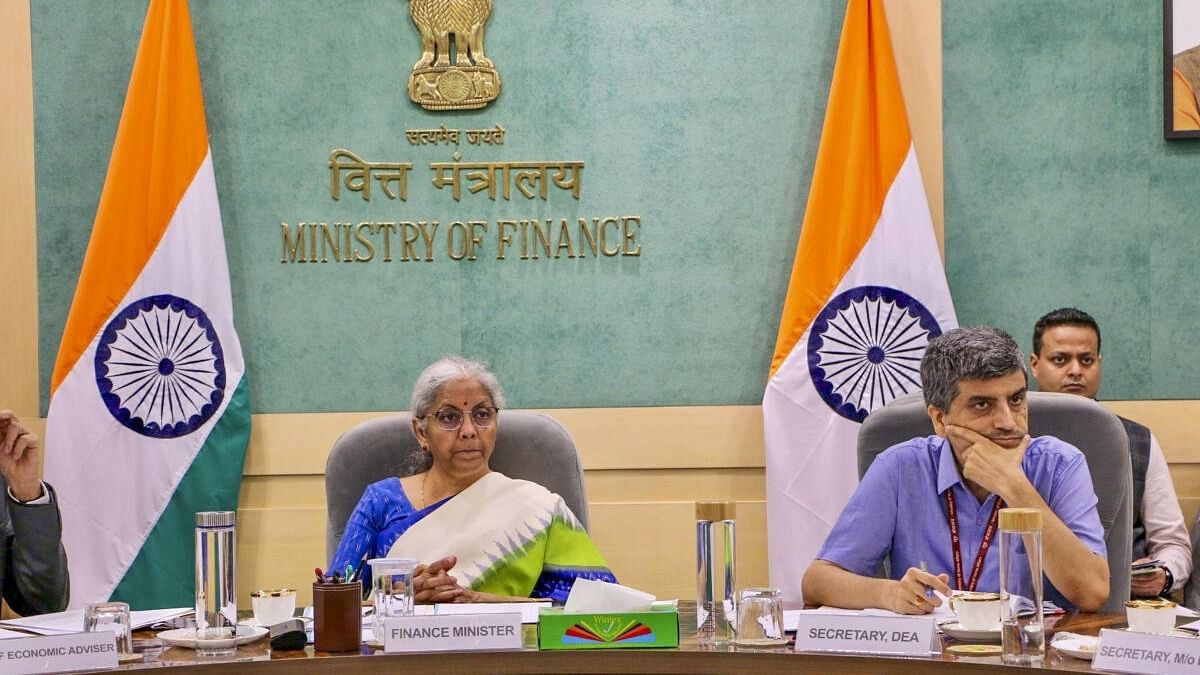
Union Finance Minister Nirmala Sitharaman chairs the pre-budget consultation meeting with representatives of trade unions and labour organisations ahead of the Union Budget 2024-25, in New Delhi.
Credit: PTI File Photo
India's economy is expanding at the fastest rate among major emerging economies, and tax receipts are higher, factors that could prompt Finance Minister Nirmala Sitharaman to increase spending in the Union Budget that will be presented to parliament on July 23.
The budget is expected to see an increase in spending on infrastructure and welfare programmes such as rural housing, following bumper dividend payouts from the central bank and increased tax revenue. However, Sitharaman is likely to adhere to the interim budget's fiscal deficit targets.
Here are some facts about India's economy:
Economic growth
The Reserve Bank of India (RBI) has upgraded its growth forecast for the fiscal year 2024/25 to 7.2 per cent, up from 7 per cent, driven by a resurgence in private consumption, robust investment, and a rebound in exports.
Similarly, the International Monetary Fund has revised India's growth forecast to 7 per cent for 2024/25 from 6.8 per cent, aligning with recent updates from rating agencies and private economists.
S&P expects India's economy will grow at nearly 7 per cent annually over the next three years.
Inflation
Retail inflation in India has eased to around 5 per cent from over 7 per cent in 2022. Still, food inflation remains persistently high at around 9 per cent, impacting rural and low-income urban households. This persistent inflation, coupled with minimal growth in real wages, is dampening expectations for early interest rate cuts by the RBI.
Fiscal deficit
India's federal fiscal deficit, which exceeded 9 per cent of GDP during the pandemic, is projected to remain around 5 per cent for the current fiscal year.
However, the combined federal and state fiscal deficits are estimated at 7.9 per cent of GDP, reflecting a large debt stock and high-interest burden that constrain the capacity for increased state spending.
High unemployment
Despite a rebound in employment in manufacturing and services, high unemployment among the educated youth remains a challenge for Asia's third-largest economy.
The unemployment rate for urban youth aged 15-29 was 17% in the first quarter of March, with private agencies suggesting that the actual rate may be higher.
India's overall unemployment rate has remained much higher over the decades than China, according to International Labour Organisation estimates, with millions remaining stuck in low-paying agriculture and informal sector jobs.
International trade
India's goods and services exports are on an upward trajectory, despite concerns over a global slowdown and geopolitical risks.
Exports are projected to reach $800 billion in the current fiscal year ending March 2025, up from $778.2 billion in the previous fiscal year.
Rising services exports and private transfer receipts have helped India's current account balance, which is showing a $5.7 billion surplus for the first time in 10 quarters in three months through March.